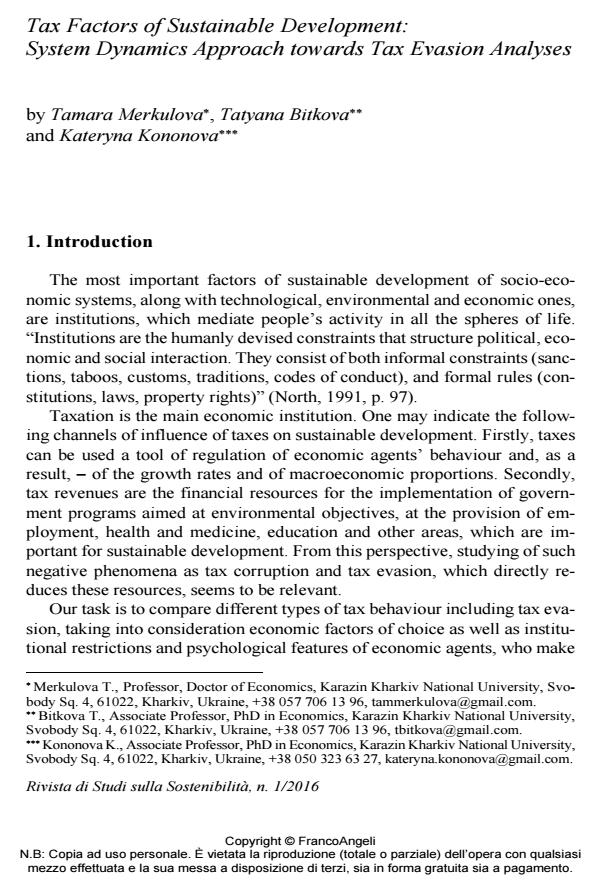Tax Factors of Sustainable Development: System Dynamics Approach towards Tax Evasion Analyses
Titolo Rivista RIVISTA DI STUDI SULLA SOSTENIBILITA'
Autori/Curatori Tamara Merkulova, Tatyana Bitkova, Kateryna Kononova
Anno di pubblicazione 2016 Fascicolo 2016/1
Lingua Inglese Numero pagine 13 P. 35-47 Dimensione file 240 KB
DOI 10.3280/RISS2016-001005
Il DOI è il codice a barre della proprietà intellettuale: per saperne di più
clicca qui
Qui sotto puoi vedere in anteprima la prima pagina di questo articolo.
Se questo articolo ti interessa, lo puoi acquistare (e scaricare in formato pdf) seguendo le facili indicazioni per acquistare il download credit. Acquista Download Credits per scaricare questo Articolo in formato PDF

FrancoAngeli è membro della Publishers International Linking Association, Inc (PILA), associazione indipendente e non profit per facilitare (attraverso i servizi tecnologici implementati da CrossRef.org) l’accesso degli studiosi ai contenuti digitali nelle pubblicazioni professionali e scientifiche.
Taxation is one of the most important institutes, influencing human behaviour, and an essential factor of wellbeing and of sustainable development. The paper is devoted to the analyses of tax evasion, which reduces tax revenues and cuts financial resources for sustainable development projects. When comparing different types of tax behaviour we consider economic factors of choice as well as institutional restrictions and psychological features of economic agents, who make decisions about tax evasion. Using an original system dynamics model we analyse comparative effectiveness of the types of tax behaviour, dependant on different instruments of tax policy, and the possible situations of conflict of interests of the state and a taxpayer.
La tassazione è uno degli istituti più importanti, che influenzano il comportamento umano, ed è un fattore essenziale di benessere e di sviluppo sostenibile. L’articolo è dedicato alle analisi di evasione fiscale, che riduce le entrate fiscali e riduce le risorse finanziarie per i progetti di sviluppo sostenibile. Confrontando i diversi tipi di comportamento fiscale noi consideriamo i fattori economici di selezione, così come le restrizioni istituzionali e i tratti psicologici degli agenti economici, che prendono decisioni circa l’evasione fiscale. Utilizzando un modello originale di dinamica dei sistemi, analizziamo l’efficacia comparativa dei tipi di comportamento fiscale, in base ai diversi strumenti di politica fiscale, e le possibili situazioni di conflitto di interessi dello Stato e di un contribuente.
Parole chiave:Sviluppo sostenibile, le entrate fiscali, l’evasione fiscale, comportamenti opportunistici, il modello di dinamica dei sistemi, la simulazione.
- Optimization of the Taxation System: Preconditions, Tendencies and Perspectives Elena G. Popkova, Irina A. Zhuravleva, Sergey A. Abramov, Olga V. Fetisova, Elena V. Popova, pp.169 (ISBN:978-3-030-01513-8)
- Dynamic Process Models for the Evaluation of the Compliance Level Evolution: Evidence from Italy Vincenzo Adamo, in Operations Research Forum 23/2021
DOI: 10.1007/s43069-020-00045-w - Economic and Financial Crime, Sustainability and Good Governance Rita Remeikienė, Ligita Gaspareniene, pp.235 (ISBN:978-3-031-34081-9)
Tamara Merkulova, Tatyana Bitkova, Kateryna Kononova, Tax Factors of Sustainable Development: System Dynamics Approach towards Tax Evasion Analyses in "RIVISTA DI STUDI SULLA SOSTENIBILITA'" 1/2016, pp 35-47, DOI: 10.3280/RISS2016-001005